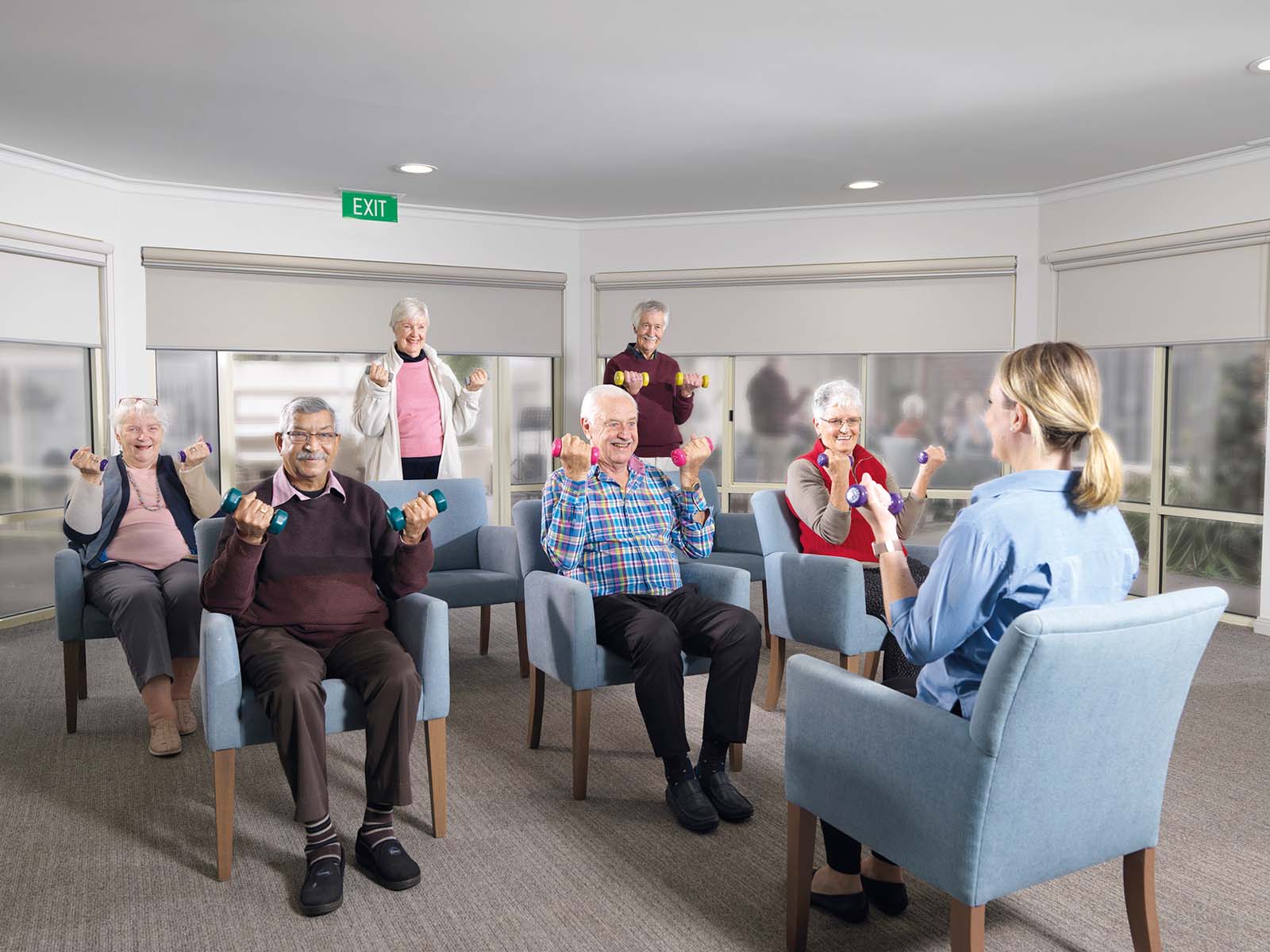- What will I need to organise before applying for residential care?
- You will need an aged care assessment before applying for residential care. This involves a nurse, social worker or other health professional coming to your home and talking to you about how well you’re managing in your day to day life. You will also need an assets and income assessment. View Faversham House 5 Step Process of moving into residential aged care flowchart.
- What is an aged care assessment?
- It’s a review of a person’s lifestyle and care needs to determine their eligibility for home or residential care. Conducted free of charge at the person’s home, it simply involves chatting with medical professionals, known as an ‘Aged Care Assessment Team’ – or ‘ACAT’ for short. The review is often referred to as an ‘ACAT assessment’, or ‘ACAS assessment’ in Victoria.
- Does everyone need an aged care assessment?
- Yes. An ACAT assessment should be top of the to-do list for anyone considering aged care.
- How do I arrange an aged care assessment?
- Contact My Aged Care on 1800 200 422 or visit their website.
- How can I prepare for my Aged Care Assessment?
- For information on how to prepare for your Aged care Assessment please visit: https://www.myagedcare.gov.au/assessment/prepare-your-assessment.
- Will I be able to obtain a place in Faversham House if I don’t have any money?
- Aged care providers are required to provide a certain number of beds to residents who have limited financial means. The ratio of beds to be provided is prescribed by the Australian Government and depends on the location of the facility. Depending on your level of assets and income, part or all of your costs may be met by the Australian Government.
- When do I have to choose how I pay for my accommodation costs?
- You will have up to 28 days after entering permanent residential care to select how your accommodation costs will be paid i.e. Refundable Accommodation Deposit (RAD) or Daily Accommodation Payment (DAP) or a combination of both. During this 28 day period, you will need to pay the DAP whilst you make your decision.
- What is Faversham House position on staffing ratios?
- BASScare strongly supports aged care providers being held to account for providing quality care to residents, 24 hours a day, and a safe environment for staff. All BASScare staff are carefully selected and high skilled and experienced in aged care; their qualifications and training and the way they work are critical to our care model that recognises the acuity and changing needs of residents. We maintain very high staffing ratios, and our facility has six units, with an in-charge Manager for each unit. A Registered Division One Nurse is in attendance at all times, with a team of Division Two Nurses and Personal Care attendants to assist.
- Do you have registered nurses on site?
- Yes. You will find a Division 1 Registered Nurse onsite at each of our facility’s 6 units, 24 hours a day. We are one of the few aged care providers in Australia to offer residents and their families this peace of mind.
- Is there someone I can talk to about my and my family’s emotional wellbeing after the transition into residential care?
- Please visit the following websites for information regarding emotional support for residents and family:
– Overview – Aged Care Planning.
– STRP-General-Flyer-19104.pdf (relationshipsvictoria.com.au)
– Moving into residential aged care (relationshipsvictoria.com.au)
– Aged Care Counselling | ACRRM eHealth - What types of care are available at Faversham House?
- Respite Care: typically involves a stay of at least two weeks, during which support services and clinical care are all provided. Respite care residents are also encouraged to participate in the available leisure and lifestyle options. Respite care is ideal if you need a break from caring for a loved one, or when an older person has left hospital, but is not quite ready to return to their home.Permanent Aged Care: is when an individual moves into Faversham House to stay. Round-the-clock personalised care, a beautiful room, quality meals, domestic services, leisure and lifestyle options, and plenty of social and mental stimulation are just some of the benefits enjoyed by our permanent residents.Dementia Care: Faversham House has the capability to care for individual living with dementia, with many integrated and dedicated spaces for those who may wander and require the added safeguard of a secure area.Palliative Care: is for people of any age who have been told that they have a serious illness that cannot be cured.At Faversham House, we are on the journey with you and understand the needs of patients and their families is higher at this time. We will help in developing the best care plan to support you and your family. We will assist to manage symptoms and improve their quality of life as fully and as comfortably as possible. Additional types of care available are: Physiotherapy, speech therapy, specialist dentist, Podiatrist, dietician, wound consultant, optometrist, geriatrician, psychologist and psychiatrist.
- Can my parents stay together if they go into aged care at the same time?
- We have numerous couples staying at Faversham House, however we do not have Double Rooms, each resident will require their own individual room.
- What if mum doesn’t speak English very well?
- We’re proud to say our care homes have staff and residents from a variety of cultural backgrounds. If you would like to know if our staff or residents speak the same language as your mum, please call 03 8809 4000.
- Can my brother leave his care home to go on holiday with us?
- Yes. Your brother can be away for up to 52 nights in any financial year on what’s known as government allocated ‘Social Leave’. To ensure he has the necessary support while he’s gone, we strongly advise that you speak with your Faversham House Residential Manager.
- I am paying for my accommodation with a Refundable Accommodation Deposit. What would happen if I were to pass away?
- If you pass away while residing at Faversham House, we are required to follow the laws of probate, where the court determines who has authority to collect and distribute your estate. Once we receive official confirmation that probate has been granted, we will refund your deposit – less any fees you agreed to have deducted – within 14 days. The time required for probate to be granted can vary considerably. By law, a Refundable Accommodation Deposit can only be returned to the resident, or their estate. It is not possible for the amount to be paid directly to family members or other parties.
- How much does residential aged care cost?
- You’ll find detailed information on our Faversham House 5 Step Process page.
- What is the procedure for labelling clothing?
- Brand new clothes are brought in by the family, given to the laundry, labelled and then delivered to the resident in their room.
- How often can my family and friends visit?
- There are no restrictions on visiting in a non COVID time. We just ask that visitor’s tale into consideration the impact their visit may have on the other residents at all times.
- What if I need to go to the hospital?
- In an emergency situation, we make contact with the Medical Decision Maker of the resident and liaise with them in making the best decision for the health and wellbeing of the resident. In an elective admissions situation, the resident or primary contact needs to provide the details of the admission to the Nurse on the unit and they will coordinate preparations as required.
- Can I use my own General Practitioner?
- Yes. All residents are entitled to nominate their own GP. If your nominated GP is unable to treat at Faversham House, we do have in house GP’s available when required.
- How are wounds treated at Faversham House?
- All wounds are treated in house at Faversham House. To provide the best practice in treatment of wounds, trained nurses implement wound care management plans, use the highest quality products and ensure dressings are changed on a regular basis.
- How is incontinence managed at Faversham House?
- Many people feel embarrassed or ashamed to talk about these problems. Caring for someone with continence problems means finding out how to expect and manage certain situations. At Faversham House, we provide a continence assessment to:
– To identify and treat potentially reversible causes of incontinence,
– To develop an individualised continence management plans that meets the residents’ needs, and
– To enhance residents’ dignity concerning bladder and bowel elimination.Different treatment options for incontinence will be discussed with the resident, family and/or specialist. These options include medication, bladder training, pelvic floor muscle training and an unlimited supply of high quality sanitary products as required by the resident. - How does Faversham House manage pressure injuries?
- Once a pressure injury has been diagnosed it can be hard to heal. Here at Faversham House we try to prevent pressure injuries from occurring. The best way to prevent pressure injuries is to remove the pressure; we encourage residents to change position regularly (if a resident is unable to move on their own, then staff will assist as required), provide top of the range king size mattresses, offer a healthy and nutritious diet, provide regular skin checks as necessary and create individual care plans.
- Pain Management at Faversham house
- A comprehensive pain assessment is important in designing a tailored pain management program for a resident. Correct diagnosis of the cause of pain is needed as different types of pain are more responsive to certain treatments and the underlying cause of pain may be remediable. For mild aches and pains, pain management that address symptomatic relief may be sufficient. If the pain is more persistent, symptomatic relief may only be needed when pain is particularly problematic, such as prior to activities of daily living. When pain is persistent, interferes with function and is non-responsive to conventional treatment, a more careful assessment with an integrated biopsychosocial approach may be required.
- Do you use chemical restraint at Faversham House?
- No, at Faversham House we don’t use chemical restraints to manage residents. However, we do use medication to treat diagnosed medical conditions.
- If my dad doesn’t have memory loss can he still reside in the Assisted Memory Unit?
- No, the unit is for residents requiring Memory Support only and generally only those who can’t walk.

